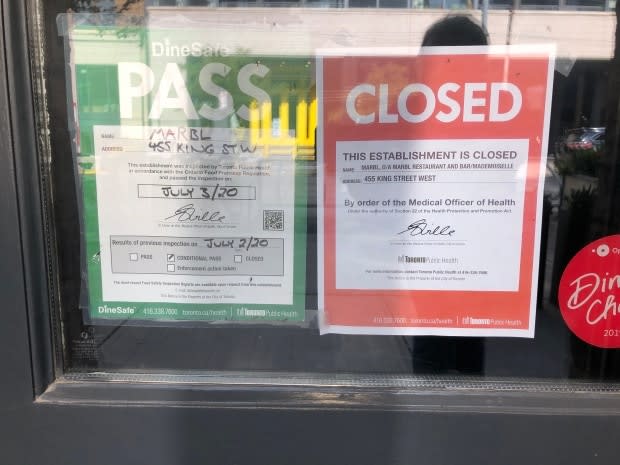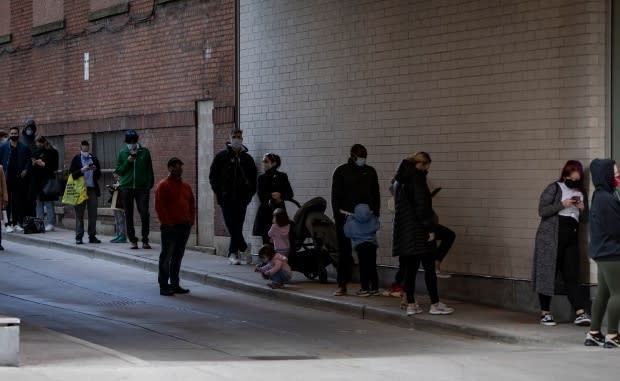Ontario reports 491 new cases of COVID-19, highest daily increase since early May
Ontario reported that the province had 491 new cases of COVID-19 on Sunday, the highest number since May 2.
Toronto, Peel Region, Ottawa and York Region led the daily case count, according to Ontario Health Minister Christine Elliott.
Elliott said in a tweet that there are 137 new cases in Toronto, 131 in Peel Region, 58 in Ottawa and 58 in York Region.
A full 63 per cent of cases are among people under the age of 40.
The province processed more than 42,500 tests on Saturday.
As of Sunday at 10:30 a.m., a total of 2,839 people in Ontario had died of COVID-19, according to provincial figures. A tally by CBC News, however, using data from public health units, has found that 2,879 people have died of COVID-19 in the province as of Sunday at 5 p.m.
A total of 112 are hospitalized, a number that is on the rise. On Saturday, the province reported that there were 100 people in hospital.
Of the people in hospital, the province says 28 are in intensive care units and 16 of them are on ventilators. The number of people on ventilators has increased by one since Saturday.
Ontario has a cumulative total of 49,831 cases, of which 42,796 are marked as resolved.
Rise in new cases 'of great concern,' province says
Ivana Yelich, spokesperson for Ontario Premier Doug Ford, said the provincial government is concerned about the increase in the daily case count.
"The rise in cases continues to be of great concern. That is why our government took action to tighten public health measures on private social gatherings as well as restaurants and bars. It's important to note that the results of these actions will not be seen immediately," Yelich said on Sunday.
"It is, however, critical that Ontarians continue to do their part in controlling the spread of COVID-19 by following the rules that are in place," she added.
"We will continue to monitor the situation very closely and act on the public health advice of the Chief Medical Office of Health and the COVID-19 Command Table."
The tightening of public health measures to slow the spread of the virus took effect in the last 10 days in Ontario.
Ontario's bars and restaurants, for example, can no longer serve alcohol after 11 p.m. as of this weekend. Strip clubs have also been closed.
As well, private social gatherings across Ontario are now limited to 10 people indoors and 25 people outdoors. That limit was imposed on Sept. 19.
Ministry monitoring rise in hospitalizations
In a separate statement, the Ontario health ministry said it is keeping a close eye on the number of hospitalizations and is continuing to build capacity in the health care system.
"We are in the process of rolling out our comprehensive fall preparedness plan, which includes public health measures to prepare the health system for a second wave of COVID-19," the ministry said.
The ministry said the government, with the help of public health experts, is reviewing trends to determine if public health measures need to be tightened further.
In particular, the government is looking at such criteria as: virus spread and containment, including the number, type and settings of outbreaks; testing capacity of the province's network of labs; and the ongoing capacity of the health care system and public health care system.
"Our government will continue to use evidence and scientific advice to inform our decisions," the ministry said.

Toronto Public Health closes 3 restaurants
In Toronto, where 1,178 have died of the virus as of Friday, Toronto Public Health (TPH) has temporarily closed three downtown restaurants to protect the public from COVID-19.
MARBL, King Taps and Casa Mezcal received orders on Friday night to close. A fourth is being served with an order.
TPH is notifying staff and patrons of two other establishments, Yonge Street Warehouse and Regulars Bar, this weekend that they may have been exposed to COVID-19. Seven cases are linked to Yonge Street Warehouse, while three cases are linked to Regulars Bar.
Ottawa Hospital to manage 2 long-term care homes
On Friday, the province announced that The Ottawa Hospital will take over care of residents at two Ottawa long-term care homes with serious COVID-19 outbreaks.
The Ontario long-term care ministry said the "voluntary arrangements" between the hospital and Extendicare, which operates West End Villa and Laurier Manor, will help the homes to address and contain COVID-19 within the facilities.
According to Ottawa Public Health, West End Villa has had 85 cases and 11 deaths since Aug. 30, while Laurier Manor has had 19 cases this September. Laurier Manor was hard hit in the spring, with more than 100 cases and 25 deaths.
Individual protective measures matter, health officer says
On Sunday, Dr. Theresa Tam, Canada's chief public health officer, said in a statement that, as of Friday, an average of 1,175 cases were being reported daily across Canada over a seven-day period.
She said labs across Canada continue to test at a high rate, with an average of nearly 70,000 people tested daily last week and 1.4 per cent of these testing positive.
"As we head into another week, we need to be vigilant about rising cases and increasing hospitalizations, particularly in areas where cases are increasing most rapidly," Tam said.
"Surges in cases, leading to increases in hospitalizations can quickly overwhelm public health and healthcare system resources in localized areas, while increasing the likelihood of spread to more areas."

Tam said every protective measure that Canadians can take matters to lower the overall rate of infection in communities because every person that people encounter brings a "whole network of contacts history with them."
Reducing the number, duration and closeness of encounters makes a difference, she added.
"The quickest and safest way for Canada to get back on the slow burn is for us all to for us to take every measure during every moment of our day, and always act in a way that can prevent the spread of illness to others," Tam said.
That means keeping a two metre distance from others outside of individual bubbles, frequent hand washing, wearing a mask where appropriate, limiting the amount of time and number of people in close contact, choosing lower risk settings or situations where public health measures are in place whenever possible.
Still have questions about COVID-19? These CBC News stories will help.
Is another lockdown coming in Ontario? What do we know about the Ford government's fall plan?
CBC Queen's Park reporter Mike Crawley obtained a draft copy of the plan
What's the latest on where I should get tested?
It's confusing, but here's an explainer complete with a flow chart
What's the most recent guidance on mask use?
Reporter Lauren Pelley took a look at what the experts are advising
What should I do about my COVID bubble?
With cases going up, even small gatherings are getting riskier
Who is getting COVID-19?
CBC News crunched the data from across Canada to get the clearest picture possible


